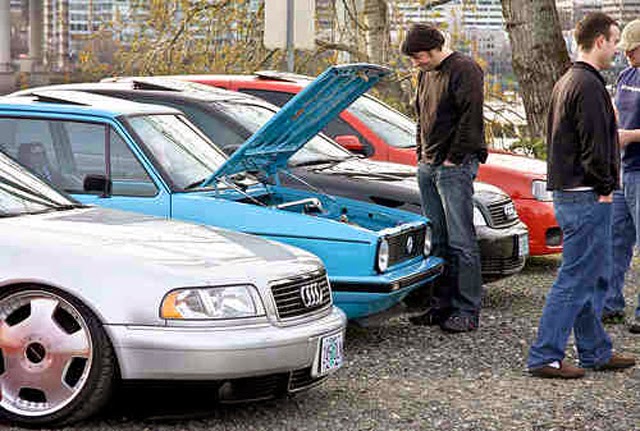There are people who would rather buy a used car than a brand new one for various reasons. Some may just need a car but may not have think the getting a brand new is a necessity , while other may just want to modify a ride.

Budget
Make an estimate on how much are you will to shed for a car. What is your limit? Consider the fees for insurance, registration, running costs and maintenance. Be ready for these payments. If you plan to get a loan, better to check other shops first to compare the rates.
Research
Try to look through the different car ads for the used cars. Check the common prices for the model you are eyeing. You can check online if the market price of the car you are intending to buy is either too expensive or too cheap.
Cars that have way too low prices can easily catch attention. If you intend to buy it, make sure to have it checked as they are usually too good to be true.
The right car
Take some time to browse for various types of models, its make, body type and prices to choose which one fits you, your needs or your lifestyle. Get out there and window shop with alist of details such as the age, model and location. Take some time to check if a new model is coming out as it will likely lessen the prices of the previous models.
The seller
When you talk to the seller do not hesitate to ask various questions such as long long the care have been in their shop, the reason is it being sold, any history of damages, the current condition, and some small stuff such as its ‘bad habits’.
Look at the car
If you plan to buy a car from a private seller, make sure to drop by their house and check the car yourself. Remember to check if the address is the same one in the registration. Do not forget to bring a copy of the advertisement. Check the odometer and other details.
History
Do not just be bought off by the seller’s story. Check the car’s history and make sure it is not stolen. Also check if it is under an outstanding loan or has a previous write off. You should be able to get the VIN number and have it checked in the state’s database. This can save you a lot of problems in the future. You might spend a small fee but other states offer the service for free.
Check the car
Check the car yourself and have an independent mechanic help you out. See if there are any mechanical problems and previous damages. This can save you a lot of money and headaches.
Check it in a place that is well lit sauch as outside in full daylight to easily spot marks, dents and other body defects. Check under it like the bonnet and the interior carpets. If you see welding marks, the car might have been in an accident.
Under the bonnet, see if there are leaks on top of the engine and under it. Check the amount of oil with a dipstick. Low oil level indicates that the owner is not looking after the car.
Look at the oil filter cap. Inspect for any white mayo like substance that indicates head gasket damage. This can lead to expensive repairs. The tires should be in good condition. Front wheels must be correctly aligned with the rear ones otherwise, it might have been in an accident.
The gaps in between body panels must be equal. Seatbelts must be working fine, dashboard and steering wheel must be correctly bolted, all switches should work, and seats must move properly. Try to start the car with the cold engine ti make it easier to see the problems.
Test drive
Even before you drive it, make sure that when you put the lock to the other, there will be no abnormal sounds such as banging and knocking. Test the handbrake by pulling if on and easing the car slowly. The car must be held back. Be mindful of any noises in the engine. Do not get distracted by a radio or the seller’s sales talk. If it is possible take it to different roads with different surfaces. Use all the gears and you should be able to change gears smoothly. See it the clutch pedal bites halfway.
Negotiate the price
Do not be shy to bargain. Make note of the faults you had detected and try to calculate how much should be cut off from the original prices. With this in mind say the price to the seller and ask their best price. Upon hearing their price keep quite so the seller will just have to turn down your offer, accept it or give you a lower price to their previous one.
Paperwork, Payment
All the paperworks must be in order and make sure all the original documents are handed to you. Do not just take the copies. These must include, registration paper, logbook and service history. Get the receipt upon payment and make sure all the seller’s detail are in written in it.


